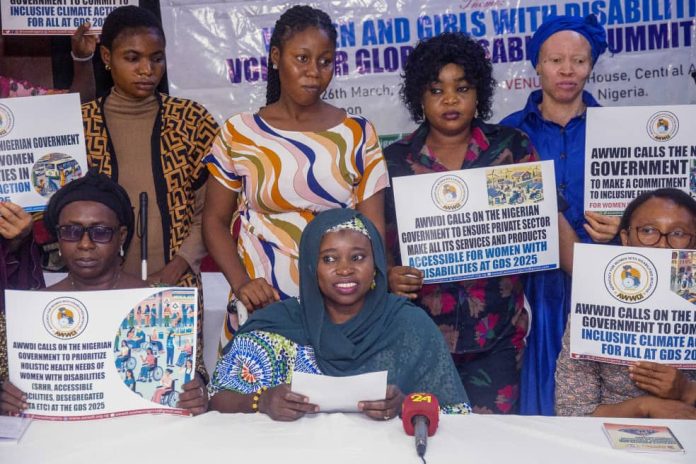As the world gears up for the Global Disability Summit (GDS) 2025, the Advocacy for Women with Disabilities Initiative (AWWDI) has issued a strong call to the Nigerian government, urging it to take decisive actions to foster a more inclusive society. With millions of women with disabilities (WWDs) in Nigeria facing systemic barriers that hinder their full participation in social, economic, and political life, AWWDI is advocating for policies that promote inclusion and equal opportunities.
In a statement released by Bilikisu Yakubu, National Coordinator of AWWDI, the organization emphasized that while Nigeria has made strides in disability inclusion, much more remains to be done. According to AWWDI, GDS 2025 presents a critical opportunity for the Nigerian government to not just make commitments but take tangible actions that will improve the lives of women and girls with disabilities.
AWWDI’s Key Priorities for GDS 2025
At GDS 2025, AWWDI is pushing for the Nigerian government to focus on the following critical areas:
1. Inclusive Employment: Equal Job Opportunities for WWDs
Despite policies against workplace discrimination, many WWDs continue to face exclusion, bias, and inaccessibility in employment. AWWDI demands that the Nigerian government enforce anti-discrimination laws, create accessible work environments, and support entrepreneurial opportunities for WWDs to ensure economic independence.
2. Inclusive Humanitarian Actions: Leaving No One Behind in Crisis Response
Women and girls with disabilities are often the most vulnerable during crises—whether it be conflicts, natural disasters, or pandemics. AWWDI is calling for the Nigerian government to prioritize disability-inclusive humanitarian responses, ensuring that emergency preparedness and relief programs cater to the specific needs of WWDs.
3. Inclusive Education: Accessible Learning for All
Access to quality education remains a significant barrier for many WWDs due to inaccessible school environments, lack of assistive devices, and discriminatory practices. AWWDI insists that all educational institutions must be disability-friendly, with inclusive curricula, accessible classrooms, and trained educators to support students with disabilities.
4. Holistic and Affordable Healthcare: Addressing the Needs of WWDs
Healthcare services in Nigeria often fail to accommodate women and girls with disabilities, particularly in sexual and reproductive health rights (SRHR). AWWDI is demanding that the government provide affordable, disability-friendly healthcare services, ensuring that WWDs can access essential medical care without discrimination or financial hardship.
5. Inclusive Digital Platforms: Ensuring Digital Accessibility
With digital technology shaping modern education, employment, and communication, WWDs must not be left behind. AWWDI is urging the government to make digital platforms accessible, promote assistive technologies, and ensure that digital literacy programs reach women and girls with disabilities.
6. Community Development: Integrating WWDs in Governance and Social Programs
AWWDI stresses that women and girls with disabilities must be actively included in community planning, governance, and social development programs. Too often, their voices are ignored in decision-making processes that affect their lives.
7. Inclusive Climate Actions: Protecting WWDs in Environmental Policies
Climate change disproportionately affects persons with disabilities, yet policies often fail to address their unique vulnerabilities. AWWDI calls for disability-inclusive climate adaptation strategies, ensuring that WWDs are considered in national and global climate policies.
8. Accessible Infrastructure: Creating Disability-Friendly Public Spaces
From government offices to transport systems, public infrastructure in Nigeria remains largely inaccessible to PWDs. AWWDI is demanding urgent action to ensure that all public spaces, transportation networks, and government facilities are made accessible to promote independent living and full participation in society.
9. Disability Justice: Strengthening Legal Frameworks
Nigeria has laws protecting persons with disabilities, but implementation remains weak. AWWDI is calling for stronger enforcement of disability rights laws, improved accountability mechanisms, and the elimination of discrimination in all sectors.
10. Inclusion in Social Protection Programs
Government-led social protection and economic empowerment programs must be deliberately designed to include WWDs. Many social intervention programs fail to address the unique needs of persons with disabilities, leaving them further marginalized.
11. Private Sector Accountability: Enforcing Disability-Inclusive Business Practices
The private sector plays a crucial role in fostering disability inclusion. AWWDI is demanding that businesses provide accessible services, create inclusive workplaces, and invest in disability-friendly policies that ensure equal economic participation for WWDs.
12. Dedicated Financing for WWDs: Budgetary Allocation for Inclusion
Without dedicated funding, disability inclusion policies remain mere rhetoric. AWWDI is urging the government to establish a specific budget line for WWDs—ensuring financial resources are allocated to support empowerment programs, healthcare, education, and accessibility initiatives.
From Commitments to Action: The Time is Now!
AWWDI is making it clear—the Nigerian government must not attend GDS 2025 simply to make promises. It must show genuine commitment through policy implementation, enforcement of disability rights laws, and sustainable inclusion efforts.
According to Bilikisu Yakubu, Nigeria has the potential to be a leader in disability inclusion, but this will only happen if the government moves beyond talk and takes meaningful action.
“Women with disabilities deserve to live with dignity, independence, and equal opportunities. The time for action is now!” she emphasized.
Call to Action: Making Inclusion a Reality
AWWDI is calling on policymakers, stakeholders, international partners, and the private sector to join forces in ensuring that the priorities outlined for GDS 2025 translate into real, measurable change.
As the world watches, Nigeria has a chance to set an example for other nations in achieving true disability inclusion. Will the government rise to the occasion?
The answer lies in action.


